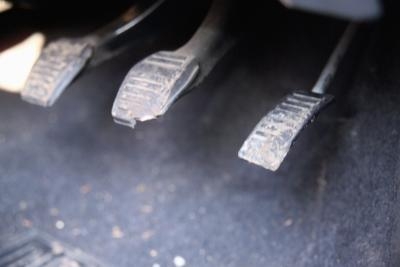
The clutch pedal is what a driver of a manual transmission presses in order to change gears. This type of transmission is found on many sports cars and heavy duty trucks. In addition, drivers who prefer more control over their vehicles often prefer manual transmissions. However, clutch pedals wear out over time because of the friction built up while driving and changing gears. This inevitably creates clutch pedal problems.
Clutch pedals slip when their discs start to wear. The most common cause of premature clutch disc wear comes from the driver riding the clutch. Riding the clutch happens when a driver operates a vehicle with his foot resting on the clutch pedal. This causes the clutch disc to wear because the pedal is always pressing on it, which prevents it from cooling down after each shift.
Sometimes oil leaking from the engine or transmission onto the clutch disc prevents the disc from clamping down evenly. This can also makes the clutch slip.
Several factors can cause the clutch pedal to make noise. If the clutch makes a squealing noise that goes away when the clutch pedal is engaged, the most likely culprit is a worn release bearing. If this is the case, the bearing needs to be replaced as soon as possible to ensure no further damage is done. If you hear a grinding noise when the clutch pedal is pressed, it usually means the transmission input shaft bearing is going bad. A chirping noise that can be heard when the car is in neutral means that the pivot ball contact point is wearing out. All of these noises inform the driver that there is a clutch pedal problem that needs to be taken care of as soon as possible, to prevent a more expensive repair.
If the clutch pedal will not release, it means the slave cylinder is beginning to go bad or the linkage is misaligned. This happens when the disc continues to turn the shaft, making the vehicle stall when coming to a stop or not allowing the operator to change gears when attempting to shift from gear-to-gear. If this occurs, you will need to take the vehicle to a qualified clutch technician to have the problem repaired, to prevent major damage to your transmission. Other causes that prevent the clutch pedal from releasing include a stretched release cable, worn clutch pedal bushings or input shaft splines that are not lubricated.